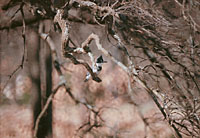 My
favorite bird, the Belted Kingfisher. Note the doughnut
shaped highlights from the mirror lens. The vertical line
to the right of the bird is a roller mark caused by
defective film processing.
|
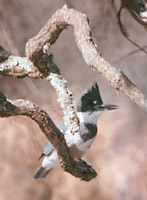 Here
is the center of the previous picture. The Kingfishers
always keep too far away from me for a clean shot. This
shot is not sharp, but still pretty good for hand-held
from thirty meters away.
|
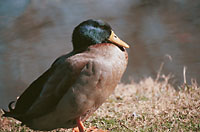 With
careful attention to background, the doughnut shaped
highlights can be heightened or subdued. Here the grass
just shows a few doughnuts, while the smooth water behind
reflected no highlights at all.
|
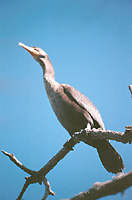 Cormorant
against a clear blue sky. This fellow seemed oblivious to
me as I stood under his tree and clicked the shutter.
|
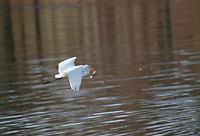 Trying
to catch a bird in flight is difficult even with
autofocus... so this shot with a manual focus mirror lens
is about as good as I can expect unless I get a lot
luckier than usual.
|
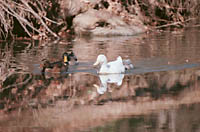 The
fascinating reflections and smooth earth tones of this
picture surprised me. I'm also surprised I got the shot
in focus, since they were swimming towards me at a pretty
good clip.
|
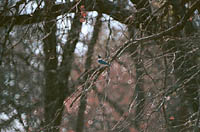 Another
shot of the Kingfisher. Still too far away. And there are
more doughnuts than bird in this photo.
|
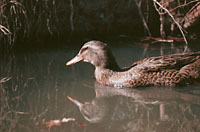 Here's
another nice ducky with reflections. A second shot of
Unsharp Mask would might have been called for here, but I
prefer to keep the sharpening to a minimum and just let
the lens do the work - if it can.
|
So is an inexpensive 500mm f8
mirror lens a good investment? That's a
personal decision, but here's my opinion: yes, if one has
an extra $100 to spend, and if one is willing to work
within the limitations of a mirror lens.
However, in the long run I think a better investment
would be a sharp 300mm f4. That would require adding a
teleconvertor to get equivalent focal length. I'll work
on a page with a 300/4.5 plus 1.5x TC to show the results
from that combination.
|
| These photos were all
shot using an older Spiratone 500/8 mirror mounted on a
Pentax PZ1p. It is possible that my Spiratone is better
or worse than currently available mirror lenses. I have
no research that would allow me an informed opinion on
its quality compared to others. |
The handling of the
Spiratone is a challenge. The focus ring is large and
easy to turn, so it is difficult to put my left hand on
the lens to steady it for the shot. Its build quality is
excellant - all metal and glass. Light but solid at the
same time. |
This lens has a long hood,
which is a necessity for almost any lens if one wants to
reduce flare and insure good contrast.
Depth-of-field at 500mm f8 is pretty darn thin. The best
bet is to shoot with the lens until you understand its
limitations. |
| This film was scanned at 900 dpi using
a Nikon Coolscan III film scanner. Photos were cropped in
Photoshop close to full frame, except for the close-up of
the Kingfisher. The Coolscan can do 2700 dpi, but for
quick web scans 900-1350 gives plenty of pixels to work
with. |
After scanning these images, I worked
with them one at a time. I resized each to 450 pixels
tall, adjusted levels until I liked the appearance on my
monitor, applied one application of Unsharp Mask at 50%,
then saved at a JPG quality that gave a 65K-85K file. |
Then I resized that image to a max of
200 pixels tall or wide, applied another shot of Unsharp
Mask, and did a Save As adding a space in front of the
original file name. Pages were created with FrontPage
Express using a standard template I built which is
optimized for my 19" monitor. |

